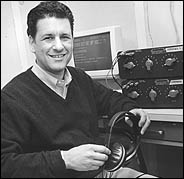Daniel Levitin
| Students interested in doing a little celebrity-gazing might be well advised to sign up for psychology professor Daniel Levitin's courses next year.
 PHOTO: ANDREW DOBROWOLSKYJ PHOTO: ANDREW DOBROWOLSKYJ
|
No promises, but Levitin did have musicians Aimee Mann and Julia Fordham turn up for a course he taught at Stanford last year. And he has recently worked with the likes of Stevie Wonder, helping to select the songs for a greatest hits compilation and writing the album's liner notes.
Levitin's life has long revolved around music, but from markedly different vantage points.
A respected record producer and engineer, he developed custom-modified guitar amplifiers for a number of albums, including Chris Isaak's smash hit, "Heart Shaped World."
A music journalist, Levitin has interviewed Joni Mitchell, John Fogarty, Paul Simon, k.d.lang and Tori Amos for magazines such as Billboard and Grammy.
And as a research psychologist, Levitin spends a lot of time probing topics such as absolute pitch, tone deafness, music's role in memory and musical creativity.
"People with absolute pitch can label musical notes the way the rest of us are able to label colours," Levitin says of one of his research interests. "They don't have to go running to a piano to identify a B flat anymore than we have to run to a rainbow to identify green."
Why does absolute pitch matter? "It's a window into how memory works. Some people have this ability, but most people don't. Why not? We can all label colours, why doesn't it work that way for music?"
Levitin's work will be assisted by $500,000 in new high-tech equipment for his music cognition lab, courtesy of a successful CFI grant application. One of the items he'll be getting as a result is a specially designed piano that can carefully track the pressure applied to its keys by different players. It's a tool for determining, among other things, how highly gifted musicians apply their talents.
"Success in music is very different in pop and classical music," notes Levitin.
"In pop, I've spoken to people like Stevie Wonder about what sets him apart from other musicians and his answer is 'luck.' It's not that he's not amazingly talented, he is, but he honestly believes that there are a hundred other people who are just as good as he is that no one has heard of because they didn't have the same opportunities. Neil Young believes that too.
"In classical music, the people at the top really do excel in a way that others can't. They're in a different realm. Their memory [for music] is better. They have more discipline. Even their bodies seem suited to their instruments.
"I met Oscar Peterson and when I shook his hand, I noticed how enormous it was. His hands were twice as big as mine. I could see how his fingers could easily stretch across the keyboard when he plays. His body was built for his instrument. It makes me think that people have to find the right instrument [to really meet their potential]. There might be hundreds of kids playing piano who ought to be learning the violin and vice versa."
After bouncing back and forth between academe and the music industry, Levitin decided to commit himself to university work.
"I like teaching and I like doing research. These are all-consuming activities. It's hard to do them on the side. I can still write the odd article now and then."
Levitin says it was his graduate studies advisors who steered him towards using music in his research. "They encouraged me to leverage my expertise — the experience I built up listening carefully to music and thinking about musical structures."
Levitin joined the University in January and he is excited about the move.
The Department of Psychology has an international reputation, he notes. McGill offers him the chance to work with people like psychologist Al Bregman, a pioneer in the psychology of hearing, neuropsychologist Robert Zatorre, one of the world's top authorities on music cognition, and Wieslaw Woszczyk, director of the Faculty of Music's Recording Studio and one of North America's most respected trainers of budding audio engineers and producers.
He is also drawn to Montreal for personal reasons. Levitin's wife is a French-speaking Belgian and the couple wants their child to speak French. Levitin's own French skills are "lagging," so landing at a top English school conveniently located in a French-speaking city strikes just the right chord.
February 14, 2005 - Editor's note: Levitin is no longer married, and the couple did not have any children, the article was referring to any potential children the couple might have had.

